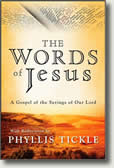The Words of Jesus: A Gospel of the Sayings of Our Lord
with Reflections by Phyllis Tickle
In his excellent book, The Saints’ Guide to Happiness, Robert Ellsberg observes that the most influential passage in the bible, in terms of inspiring the greatest number of saints to perform outstanding deeds of charity and self-sacrifice, is the following:
Jesus, when the man answered that he had done all these things for years, felt love for him and said, “You lack only one thing: go, sell everything you own, and give the money to the poor, and you will have treasure in heaven; then, come follow me.”
This passage, just as it is, contains incredible intensity and power. One need not know that it is found in the tenth chapter of the Gospel of Mark, or that Mark is believed by scholars to be the earliest canonical gospel written, or that the writer of the gospel is believed by tradition to have been a disciple of the Apostle Peter. No context or “meta-narrative” is needed to hear Jesus’ simple, yet sublime, call to perfection.
Phyllis Tickle’s latest book is an attempt to reintroduce the intensity and power of all of Jesus’ sayings. To do so, she has removed what she calls the “connective tissue” from the gospel passages. In addition, she has combined repetitive and duplicate sections into single versions, organized the sayings into five categories (the words of public teaching, the words of private instruction, the words of healing dialogue, the words of intimate conversation, and the words of post-resurrection encounters), and placed them into a rough sort of chronological order.
I have only just begun to wrestle with the words of Jesus themselves. I recommend this book, however, on the merits of Tickle’s introductory reflections. The essay runs for about 60 pages and is one of the most lucid, wise, and passionate introductions to holy scripture I have ever read. The gems contained therein are too numerous to mention here, but Tickle’s central point is encapsulated as:
The heart, it would seem, has its own consciousness and knowledge and ways that can be experienced just as the brain’s consciousness and knowledge and ways are experienced. They are just not as scientifically measurable at the moment, and may never be…. Accepting the heart as a way of knowing requires a reexamination of what sacred writ is. It forces the question of to whom or to what that holy writ is speaking, to whom or what it is directed.” (pp 36-37)
For Tickle, the only way we can “get back” to the original meaning of Jesus’ words and deeds is to listen to them with our hearts, just like the saints throughout the ages.
